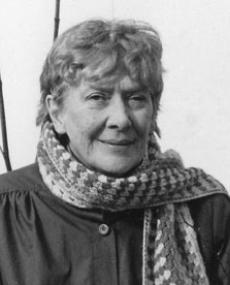
Jean Clarice Middleton was born in Durban. She attended Durban Girls' College and received an MA in English from Natal University (now the University of KwaZulu-Natal). Following this, she worked as a teacher. She was married to Harold Strachan, who was later imprisoned for his description of prison life recounted in the now defunct Rand Daily Mail.
Jean Middleton was held in detention for a year, mostly in solitary confinement.
As the police hammered on the door of Jean Middleton's flat in Johannesburg, South Africa, in July 1964, she shredded a document and flushed it down the toilet. "I had been prepared to eat it," she said later. "I knew that would be difficult, because I'd eaten a piece of paper once before to prevent its falling into the hands of the police. It had been quite a small piece of paper, but I'd found it hard to get down." When the police finally broke in and heard the toilet flushing, they threw her across the room in anger before they arrested her.
Middleton was one of a small group of white women jailed in South Africa in the mid-1960s. Moving to Johannesburg, Middleton was active in the Congress of Democrats (COD), the white, mostly communist, alliance grouping of the African National Congress (ANC). They would meet at small "tea parties" and it was at one of these that she was invited to join the underground South African Communist Party (SACP). This was a world of spray-painting and the distribution of forbidden leaflets. A fellow COD member took her on at his private college after she lost her job when the police called on her at the state school where she taught.
On one occasion, Nelson Mandela, then on the run, met his wife Winnie and their daughters, Zenani and Zindzi, at her flat – Middleton left discreetly once they had arrived.
She was arrested within weeks of the Rivonia Trial, in which Mandela and the ANC leadership were jailed for life. The Apartheid government, furious at the launching of the armed struggle, were relentlessly hunting down white radicals, considered a blight on its notion of white solidarity. After a year in detention, mostly in solitary confinement, Middleton was named as one of 14 defendants, all white people, in a trial defended by Bram Fischer, then the leader of the SACP. Middleton pleaded guilty but declined to give evidence, as she did not wish to reveal the identity of her comrades.
Some of the evidence had been obtained by a police tape recorder hidden in Middleton's flat, where the group held meetings – also where she had liaisons with one of them, Piet Beyleveld. Although the group had been infiltrated by a police spy, Beyleveld turned state witness.
Her father had passed away by this time and her mother did not contact her. "They tried to pretend to their friends that nothing had happened," she wrote. When her mother died, Middleton, as their only child, inherited the family house.
On leaving prison, she was put under house arrest and banned under the Suppression of Communism Act. She could no longer teach, nor associate with more than one person at a time. She then went to Britain, teaching English at Shoreditch comprehensive, London. At that time, Middleton then joined the anti-apartheid movement and in retirement edited the ANC journal Sechaba.
After Nelson Mandela's release, she returned to South Africa in 1991 and edited the communist paper Umsebenzi. She returned to England, wrote for the Morning Star, and left the proceeds of the sale of her London house to the paper and the SACP.
In 1998, Middleton wrote a book, Convictions: a woman political prisoner remembers that chronicled the story of her arrest and incarceration.
Middleton died of pneumonia 14 December 2010.